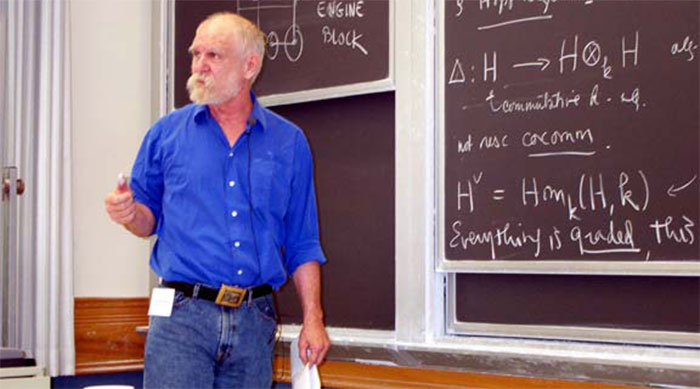Note to self: check Jack Morava’s arXiv notes on a more regular basis!
It started with the G+-post below by +David Roberts:
Suddenly I realised I hadn’t checked out Morava‘s “short preprints with ambitious ideas, but no proofs” lately.

A couple of years ago I had a brief email exchange with him on the Habiro topology on the roots of unity, and, in the process he send me a 3 page draft with ideas on how this could be relevant to higher dimensional topological QFT (If my memory doesn’t fail me, I can’t find anything remotely related in the arXiv-list).
Being in a number-theory phase lately (yes, I also have to give next year, for the first time, in the second semester, a master-course on Number Theory) the paper A topological group of extensions of $\mathbb{Q}$ by $\mathbb{Z}$ caught my eyes.
The extension group $Ext(\mathbb{Q},\mathbb{Z})$ classifies all short exact sequences of Abelian groups
$0 \rightarrow \mathbb{Z} \rightarrow A \rightarrow \mathbb{Q} \rightarrow 0$
upto equivalence, that is commuting sequences with end-maps being identities.
The note by Boardman Some Common Tor and Ext Groups hs a subsection on this group/rational vector space, starting out like this:
“This subsection is strictly optional. The group $Ext(\mathbb{Q}, \mathbb{Z})$ is much more difficult to determine. It is easy to see that it is a rational vector space, simply from the presence of $\mathbb{Q}$, but harder to see what its dimension is. This group is not as mysterious as is sometimes claimed, but is related to adèle groups familiar to number theorists.”
Boardman goes on to show that this extension group can be identified with $\mathbb{A}^f_{\mathbb{Q}}/\mathbb{Q}$ where $\mathbb{A}^f_{\mathbb{Q}}$ is the ring of finite adèles, that is, sequence $(x_2,x_3,x_5,…)$ of $p$-adic numbers $x_p \in \widehat{\mathbb{Q}}_p$ with all but finitely many $x_p \in \widehat{\mathbb{Z}}_p$, and $\mathbb{Q}$ is the additive subgroup of constant sequences $(x,x,x,…)$.
Usually though, one considers the full adèle ring $\mathbb{A}_{\mathbb{Q}} = \mathbb{R} \times \mathbb{A}^f_{\mathbb{Q}}$ and one might ask for a similar interpretation of the adèle class-group $\mathbb{A}_{\mathbb{Q}}/\mathbb{Q}$.
This group is known to be isomorphic to the character group (or Pontrtrjagin dual) of the rational numbers, that is, to $\widehat{\mathbb{Q}}$ which are all group-morphisms $\mathbb{Q} \rightarrow S^1$ from the rational numbers to the unit circle. This group is sometimes called the ‘solenoid’ $\Sigma$, it is connected but not path connected and the path-component of the identity $\Sigma_0 = \mathbb{R}$.
A very nice and accessible account of the solenoid is given in the paper The character group of $\mathbb{Q}$ by Keith Conrad.
The point of Morava’s note is that he identifies the solenoid $\mathbb{A}_{\mathbb{Q}}/\mathbb{Q}$ with a larger group of ‘rigidified’ extensions $Ext_{\mathbb{Z}_0}(\mathbb{Q},\mathbb{Z})$.That is, one starts with a usual extension in $Ext_{\mathbb{Z}}(\mathbb{Q},\mathbb{Z})$ as above, but in addition, one fixes a splitting of the induced sequence
$0 \rightarrow \mathbb{Q} \otimes_{\mathbb{Z}} \mathbb{R} \rightarrow A \otimes_{\mathbb{Z}} \mathbb{R} \rightarrow \mathbb{Z} \otimes_{\mathbb{Z}} \mathbb{R} \rightarrow 0$
Forgetting the splitting this gives the exact sequence
$0 \rightarrow \mathbb{R} \rightarrow Ext_{\mathbb{Z}_0}(\mathbb{Q},\mathbb{Z}) \rightarrow Ext_{\mathbb{Z}}(\mathbb{Q},\mathbb{Z}) \rightarrow 0$
which is isomorphic to the sequence involving the path-component of the solenoid!
$0 \rightarrow \Sigma_0 = \mathbb{R} \rightarrow \Sigma=\widehat{Q} \rightarrow \mathbb{A}^f_{\mathbb{Q}}/\mathbb{Q} \rightarrow 0$
Morava ends with: “I suppose the proposition above has a natural reformulation
in Arakelov geometry; but I don’t know anything about Arakelov geometry”…